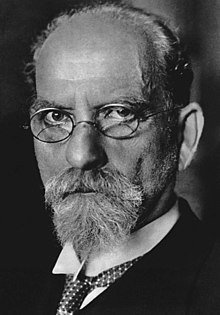A continuación, vamos a hablar sobre Edmund Husserl, filosofo y matemático alemán creador de la fenomenología trascendental. Husserl crea su filosofía en una época (inicios del siglo xx) donde él siente que la filosofía se encuentra amenazada por el surgimiento de nuevas ciencias en Europa, tal preocupación lo lleva a crear la fenomenología trascendental en la cual él desea resolver el problema de la búsqueda la verdad necesaria, es decir la esencia del ser a través del método fenomenológico, esto constituye el núcleo central de su fenomenología.
Next, we are going to talk about Edmund Husserl, German philosopher and mathematician, creator of transcendental phenomenology. Husserl creates his philosophy at a time (early twentieth century) where he feels that philosophy is threatened by the emergence of new sciences in Europe, such concern leads him to create the transcendental phenomenology in which he seeks to solve the problem of the search for the necessary truth, ie the essence of being through the phenomenological method, this is the central core of his phenomenology.
La trayectoria de Husserl se divide en tres etapas:
- La de matemático y lógico.
- La de idealista
- La de oposición entre el idealismo y realismo.
Husserl's trajectory is divided into three stages:
- That of mathematician and logician.
- That of idealist
- That of opposition between idealism and realism.
En nuestro post de hoy nos vamos a dedicar a la primera etapa, esto es: La de matemático y lógico. // In today's post we are going to focus on the first stage, that is: the mathematician and logician.

Fuente/Source
The creator of transcendental phenomenology Edmund Husserl was born into a Jewish family in the middle of the 19th century in Moravia (Old Austro-Hungarian Empire) specifically in 1859 and died in the German city of Freiburg im Breisgau in 1930.
He was a disciple of the German philosopher and psychologist Franz Brentano, and also of the German psychologist Carl Stumpf. As well as of the German mathematicians Karl Weierstraß and Leopold Kronecker, from whom he received the influences of his philosophy to create the transcendental phenomenology.
Husserl can be placed in three stages, in the first of them he was very inclined towards mathematical logic, which is reflected in his work published in 1861 entitled ''Philosophy of Arithmetic'' in which he tries to explain philosophically the origin of the positive integer or natural number, here it is evident the influence of Brentano because he uses empirical psychology as a method to perform this analysis.
For the development of this work, Huserrl considers two complementary aspects, namely: On the one hand, the psychological and logical development of the concept of number through the activity of counting, and on the other, the concept of set.
Influenced by Brentano's philosophy, Husserl wants to give a psychological foundation to these mathematical concepts, for him, the concept of number is a primitive or primary concept of arithmetic, and that arithmetic is the basis on which the other mathematical disciplines are founded, at this point we see the need for Husserl to agree with David Hilbert in setting up the whole edifice of mathematics on the basis of arithmetic in order to protect it from the paradoxes that threatened it at that time. Here we see Husserl supporting Hilbert in the creation of mathematical formalism.
Veamos que dice Huserrl en su obra «Filosofía de la Aritmética» en cuanto lo que es número y conjunto. // Let us see what Huserrl says in his work "Philosophy of Arithmetic" as to what is number and set.
According to him, both number and symbols arise from the psychological aspects of mathematical experience in an intuitive way where two elements are opposed, namely: the material and the formal. In the material we get the authentic or intuitive representation, i.e., what it contains, and in the formal we find the authentic or symbolic, i.e., the meaning. For Husserl, these mathematical concepts have their origin on the psychological plane, in a process with an objective foundation that is then extended to the formal plane. That is, the authentic representations are replaced by the non-authentic ones, that is, the "containing" is replaced by the "meaning", all this process deriving in an objective-formal system product of a deductive logical analysis.
Regarding sets Husserl affirms that "...sets are constituted by a collective link that has the function of uniting the objects that we attend to with the other objects, of which we are conscious as background". To the sets whose elements we can grasp in a sensible way, Husserl calls them finite sets, and to what we cannot, he calls them infinite sets. Husserl goes on to point out that "we start from the sensible grasp of some members of such a set in order to continue with a symbolic construction of such a set through its expansion or categorial, intellective iteration".
En el desarrollo de estos conceptos, Husserl interrelaciona dinámicamente estos tres: número, multiplicidad, conjunto y combinación colectiva. //In the development of these concepts, Husserl dynamically interrelates three concepts, they are: Number, multiplicity, set and collective combination.
Husserl affirms that number precedes multiplicity, that is to say, number appears in a multitude of objects, and that through the analysis of the concrete phenomenon, where multiplicity is what makes possible the experience of counting and then, passing from simple multiplicities to complex multiplicities and thus being able to classify, it is there when sets appear.
Amigos, en el próximo post trataremos la segunda etapa de la vida intelectual de Husserl, espero que les haya gustado este. // Friends, in the next post we will deal with the second stage of Husserl's intellectual life, I hope you liked this one.
Créditos/Credits
La Idea De La Fenomenología. Edmund Husserl. Fondo de Cultura Económica.
https://www.scielo.org.mx/scielo.php?script=sci_arttext&pid=S2007-25382013000100005#:~:text=Husserl%2C%20al%20seguir%20su%20planteamiento,(Hua%20XII%2C%20155).
https://en.wikipedia.org/wiki/Edmund_Husserl.
https://profesorvargasguillen.files.wordpress.com/2013/08/crisis-de-las-ciencias-europeas-y-la-fenomenologc3ada-trascendental-trad-julia-iribarne-krisis.pdf.
https://es.wikipedia.org/wiki/David_Hilbert.





